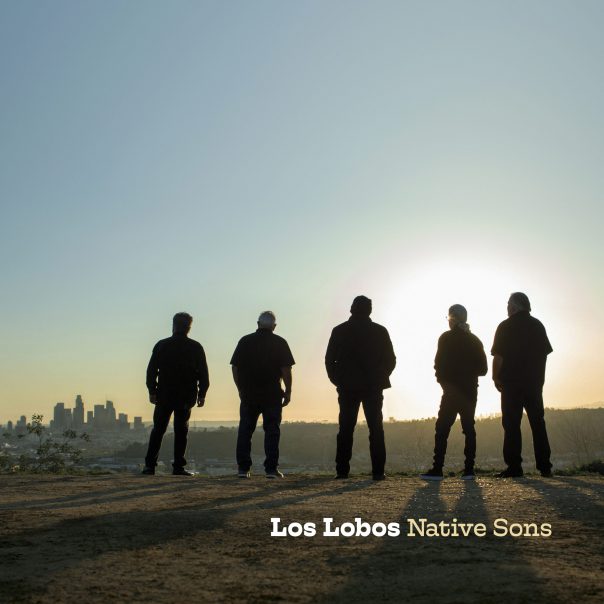ALBUM REVIEW: Los Lobos honor L.A. with ‘Native Sons’

Over the past four decades, few—if any—rock bands have evoked Los Angeles and Southern California as warmly or vividly as Los Lobos have. Of course, their SoCal is not the SoCal of, say, The Beach Boys or ’80s hair metal. It’s not catching waves, having fun-fun-fun in the T-Bird your dad bought you, or partying on the Sunset Strip. Instead, it’s more like guys walking along street medians and selling oranges. Or lying in bed at night and hearing an LAPD chopper flying overhead. Or being stuck in bumper-to-bumper traffic on I-5. Or cracking open a beer and chilling out on your porch after a long work week.
Native Sons
Los Lobos
New West, July 30
8/10
The L.A. that David Hidalgo and his bandmates celebrate is the one occupied by the multiethnic lower-middle-class. That L.A. comes through as warmly and vividly as ever on the band’s latest album, Native Sons.
Composed of 12 covers and one original song, the LP pays tribute both to Los Lobos’ musical influences and to the city they call home. The covers may not sound too different than the original versions, but that’s part of the point—these are the roots of this Mexican-American group’s roots-rock. It’s more than enough that this baker’s dozen lets Hidalgo and company flex their well-honed chops and have some fun with their gritty, yet romantic vision.
Native Sons kicks off with “Love Special Delivery,” a rumbling rocker from ’60s east L.A. Chicano group Thee Midniters. Cesar Rosas takes lead vocals and is clearly having a ball; you can hear the smile on his face as he belts out the tune. The raucous horns and frantic drumming encourage the listener to get in on the fun.
The twangy “Misery,” an R&B chestnut first recorded by Motown artist Barrett Strong, keeps the party vibe going thanks to a shuffling beat, some elegant guitar soloing, and David Hidalgo’s buttery croon. Some may quibble that Strong is more of a Detroit artist than an Angeleno—though Hidalgo points out in the liner notes that he moved to California, he cut this song well before that. Still, remember that line from “Double Indemnity:” “They say all native Californians come from Iowa.”
Next up is a Stephen Stills/Buffalo Springfield medley, “Bluebird/For What It’s Worth.” In the first song, Los Lobos do their inspiration one better thanks to the muscle in the rhythm section and Hidalgo’s tenor. On the second, Hidalgo makes the song’s political message fresh again by virtue of having written such socially conscious classics as “Will the Wolf Survive?” and “The Neighborhood.”
“Los Chucos Suaves” finds the band delving into east L.A. history. They rumba deftly through this 1940s zoot-suit anthem penned by Lalo Guerrero, commonly called the “Father of Chicano Music.” After that, Los Lobos make Jackson Browne’s winsome ballad “Jamaica Say You Will” sound right at home among their self-penned heart-tuggers. The tempo revs back up on “Never No More,” a jump blues tune from R&B crooner and Ray Charles songwriter Percy Mayfield. Steve Berlin’s honking saxophone, Phil Parlapiano’s cool keyboard and Jason Lozano’s swinging beat transport listeners back to Central Avenue in the 1940s.
The stately and soulful title tune—the sole Los Lobos original on the album—follows. Hidalgo pledges his everlasting love for his hometown, concrete rivers and all, over a lilting 6/8 beat and jangling guitars. As Steve Berlin says in the liner notes, “It kinda put everything in perspective, theme-wise.”
Los Lobos switch back to party mode with the garage-rock standard “Farmer John,” which is highlighted by Berlin’s raunchy sax solo and Rosas’ and Hidalgo’s joyous harmonies. A mellow take on Willie Bobo’s “Dichoso” cools things down before what might be the album’s greatest act of love and theft, a cover of the Beach Boys’ “Sail On Sailor.” The lyrics’ references to life’s turmoil hit so much harder coming from guys who’ve written about that turmoil more trenchantly than the Wilsons (or Mike Love) did.
The band then oozes its way through the brooding, agonized funk of WAR’s “The World is a Ghetto.” Searing wah-wah guitar lights up this track like fires from the 1965 or 1992 riots. The mood lightens from there with a loping version of The Blasters’ “Flat Top Joint.”
Native Sons closes with the bittersweet Chicano soul instrumental “Where Lovers Go.” Somehow, the steady rhythm, dreamy melody and soaring guitar solo sum up not just Native Sons but life in Los Lobos’ L.A.—the yearning, the anger, the sadness, the joy and the endurance.
Follow reporter Ben Shultz at Instagram.com/benjamin.schultz1.
